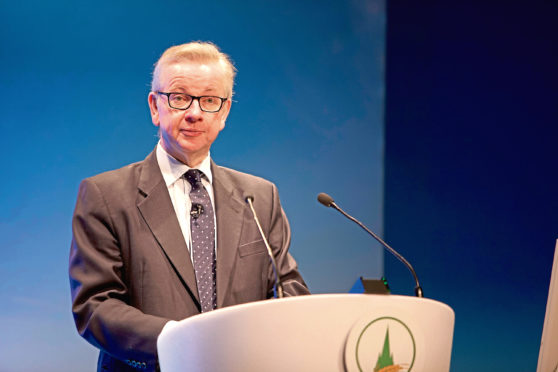Leaving the European Union without a deal would put at risk “real gains” from Brexit such as boosting productivity in farming and protecting the environment, Michael Gove has said.
The environment secretary warned the Oxford Farming Conference of the impact to sectors such as agriculture if the UK crashed out of the EU without a deal.
While he said a nation as adaptable, resilient and creative as the UK would flourish over time even without a deal, “the turbulence which will be generated by our departure without a deal would be considerable”.
Mr Gove added: “It would hit worst those who are our smaller farmers and farm businesses.”
He said tariffs, border checks and labour pressures would all add to costs for food producers.
“Nobody can be blithe or blase about the real impacts on food producers in this country of leaving without the deal,” he said.
While Mr Gove flagged up the challenges that would face farmers and the food industry exporting their products, he played down the risk of consumers facing shortages on supermarket shelves.
“We are doing everything possible to ensure that when it comes to imports both of food and veterinary medicines that we can maintain continuity as effectively as possible,” he said.
“We’ve taken steps to ensure a continuity approach. There shouldn’t be a problem with food coming into the country.”
He said leaving the EU would rejuvenate the UK’s democracy, make power more accountable and allow the country to escape from the “bureaucratic straitjacket” of Europe’s Common Agricultural Policy. And it will “develop a more vibrant farming sector with access to technologies on which the EU is turning its back”.
Mr Gove has previously set out plans for payments for “public goods” such as managing land for flood prevention, creating habitats for wildlife and improving public access to the countryside.
He said: “Leaving the EU will end support for inefficient area-based payments, which reward the wealthy and hold back innovation. And we can move to support genuine productivity enhancement and public goods like clean air, climate change mitigation or the improvement of soil, or water quality.”
Quizzed on whether the £3.2 billion the UK’s farmers receive in funding through the EU’s subsidy scheme was under threat, Mr Gove insisted it was not.
He said the money was guaranteed until the end of this Parliament, and that the case needed to be made for more investment, if farmers embraced reform in the sector and the value of public goods could be demonstrated.
Looking beyond Brexit, Mr Gove said the world is facing a fourth agricultural revolution, with new technology from gene editing to artificial intelligence, robotics and data analytics to reduce costs and improve yields.
